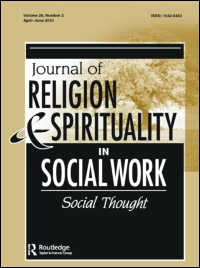
Religious coping and maternal work-conflict: uncovering the pathways to well-being
Sandra Frank PhD, LMFTa and Nicole L. Arkadie EdD, MSW, LCSW, PPSC
Abstract
Most studies examining work-family conflict have utilized quantitative methodologies, which do not provide sufficient narrative information about participants’ experiences. This qualitative descriptive study describes both the religious and non-religious coping strategies employed by Twelve (N = 12) Conservative Protestant Working Mothers with school-aged children to manage work-family conflict. The CPWM shared their experiences of how they found balance and well-being. Two research questions guided this study: How do Conservative Protestant Working Mothers with school-aged children describe their experiences of work-family conflict when transitioning between the work and home environments? How do Conservative Protestant Working Mothers with school-aged children describe the coping strategies they use to reduce or resolve work-family conflict? Prayer was found to be a coping strategy used by all of the mothers in this study, it helped to reduce their stress levels and enhance their emotional well-being.
Introduction
As more women with children enter the workforce, it is crucial for social workers to understand the intersectionality of spirituality and religion among working mothers. A national study by the Selzler et al. (2020) found that 86% of U.S. adults considered themselves spiritual, while Kim et al. (2022) reported that 63% identified with a religious affiliation.
According to the U.S. Census Bureau, in 2018, two-thirds of employed women were working mothers, and approximately 23.5 million had children under the age of 18 (Christnacht & Sullivan, 2020). Working mothers experience additional stressors as they navigate the boundaries between work and home environments. There remains a need to explore effective
strategies for managing work-family conflict to reduce emotional and psychological distress, as well as to better understand their lived experiences through qualitative research methods. While previous studies have examined work-family conflict among Protestant mothers, these studies predominantly used quantitative methods, limiting the ability to capture
the specific coping strategies participants employed to address their stressors.
Research on work-family issues and religion remains limited (May & Reynolds, 2018). Studies that have examined work-family conflict and religion have predominantly employed quantitative methodologies. Religion has been found to serve as an effective coping strategy in managing difficult situations
(Gallagher et al., 2013). Much of the research on the potential benefits of religion has focused on conservative Protestants (Civettini & Glass, 2008; Glass & Levchak, 2014; Greeley & Hout, 2006). This study builds on the work of May and Reynolds (2018) by offering a qualitative narrative that explores the experiences of Protestant working mothers and the coping strategies they use to manage work-family conflict.


